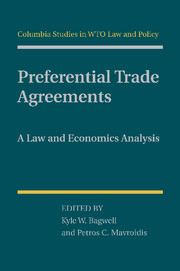Book contents
- Frontmatter
- Contents
- Contributors
- Introduction: The Law and Economics of Contingent Protection
- 1 Preferential Trading Agreements: Friend or Foe?
- The “Legalization” of GATT Article XXIV – Can Foes Become Friends?
- 2 Third-Country Effects of Regional Trade Agreements
- 3 Contingent Protection Rules in Regional Trade Agreements
- 3.1 Commentary on “Contingent Protection Rules in Regional Trade Agreements”
- 4 The Limits of PTAs
- 5 EU and U.S. Preferential Trade Agreements: Deepening or Widening of WTO Commitments
- Straightening the Spaghetti Bowl
- 5.1 Comments on “Beyond the WTO? Coverage and Legal Inflation in EU and U.S. Preferential Trade Agreements”
- 6 Labor Clauses in EU Preferential Trade Agreements – An Analysis of the Cotonou Partnership Agreement
- 7 Do PTAs Actually Increase Parties' Services Trade?
- 8 A Model Article XXIV: Are There Realistic Possibilities to Improve It?
- 8.1 Comments on “A Model Article XXIV: Are There Realistic Possibilities to Improve It?”
- Index
- References
5 - EU and U.S. Preferential Trade Agreements: Deepening or Widening of WTO Commitments
Published online by Cambridge University Press: 03 May 2011
- Frontmatter
- Contents
- Contributors
- Introduction: The Law and Economics of Contingent Protection
- 1 Preferential Trading Agreements: Friend or Foe?
- The “Legalization” of GATT Article XXIV – Can Foes Become Friends?
- 2 Third-Country Effects of Regional Trade Agreements
- 3 Contingent Protection Rules in Regional Trade Agreements
- 3.1 Commentary on “Contingent Protection Rules in Regional Trade Agreements”
- 4 The Limits of PTAs
- 5 EU and U.S. Preferential Trade Agreements: Deepening or Widening of WTO Commitments
- Straightening the Spaghetti Bowl
- 5.1 Comments on “Beyond the WTO? Coverage and Legal Inflation in EU and U.S. Preferential Trade Agreements”
- 6 Labor Clauses in EU Preferential Trade Agreements – An Analysis of the Cotonou Partnership Agreement
- 7 Do PTAs Actually Increase Parties' Services Trade?
- 8 A Model Article XXIV: Are There Realistic Possibilities to Improve It?
- 8.1 Comments on “A Model Article XXIV: Are There Realistic Possibilities to Improve It?”
- Index
- References
Summary
Introduction
There is growing concern about preferential trade agreements (PTAs) and the role they should play within the multilateral trading system. This concern stems from both their increasing number and their ever-broader scope.
During the period 1948–94, the General Agreement on Tariffs and Trade (GATT) received 124 notifications of PTAs, of which about 50 were active at the creation of the World Trade Organization (WTO) in 1995. Since then, more than 250 new arrangements have been notified to the WTO, and the number of arrangements active in 2008 was about 200. A large part of this expansion involves agreements where the European Community (EC) or the United States is a partner. As a result, the EC and the United States have become the two main “hubs” in the pattern of PTAs, with the “spokes” represented by agreements with the various partner countries.
Modern PTAs exhibit features that earlier PTAs did not possess. In particular, PTAs formed before 1995 concerned only trade in goods and took the form of (mostly) free trade areas (FTAs) or (more rarely) customs unions (CUs), involving mainly tariff liberalization. Since the creation of the WTO and the extension of multilateral trade agreements to trade in services and trade-related aspects of intellectual property rights, new PTAs also tend to cover these two subjects, which revolve chiefly around regulatory issues.
- Type
- Chapter
- Information
- Preferential Trade AgreementsA Law and Economics Analysis, pp. 150 - 172Publisher: Cambridge University PressPrint publication year: 2011
References
- 4
- Cited by

